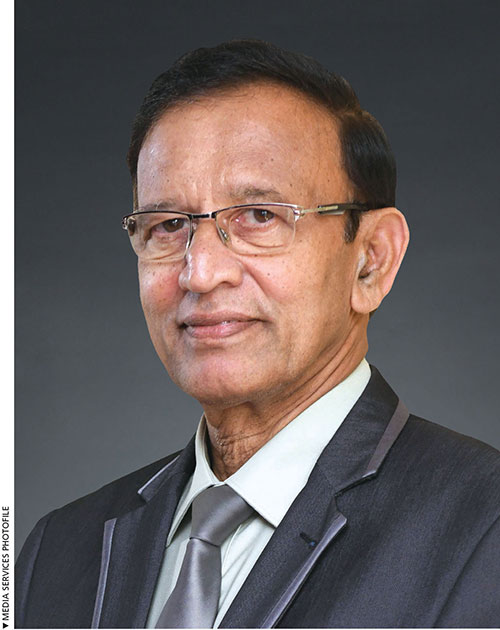BLUEPRINT FOR GROWTH
Dr. Kingsley Bernard envisions the future of the export sector amid global headwinds

Q: Could you elaborate on any new initiatives that the Sri Lanka Export Development Board (EDB) has introduced recently to promote exports and enhance the competitiveness of local products in the global market?
A: The EDB has undertaken a series of strategic initiatives in this regard. These efforts include a multifaceted approach ranging from market development such as the launch of a national export brand and participation in trade negotiations – to secure favourable market access to specialised events such as the ‘Sourced Sri Lanka: Textile & Apparel Road Show.’
Collaborations with international entities such as the Swiss Confederation underscore efforts to promote sustainability and job creation in sectors like textiles.
Furthermore, the EDB’s engagement with fashion institutions aims to elevate the quality and design of Sri Lanka’s creative industries.
In export services, the EDB has facilitated webinars and secured grants to promote sectors such as construction, IT, and marine and offshore industries. Additionally, efforts in trade facilitation and information dissemination have streamlined export processes, and addressed logistical challenges across various sectors.
Notably, partnerships with international programmes have harmonised regulations and resolved barriers to exporting agricultural products to key markets including China.
In policy and strategic planning, the EDB’s expansion of the National Export Strategy (NES) and proposals for a new national tariff policy reflect a forward-thinking approach to enhance export competitiveness.
Q: Multiple global expos were organised in Sri Lanka during the first three months of this year. How do such events benefit the exporter community?
A: Several expos were organised – including the 14th International Footwear & Leather Fair, showcasing high quality leather goods. Additionally, FACETS 2024 (Asia’s premier gem and jewellery exhibition) took place in January.
The EDB is intensifying efforts to assist companies in securing transactions, seizing new market opportunities and expanding their global footprint through internationalisation.
Furthermore, we have been helping businesses to develop skills for global expansion such as crafting corporate strategies, establishing brand and marketing campaigns, and implementing new standards.
Our objective is to encourage large businesses to collaborate with Sri Lankan enterprises in their supply chains, facilitating mutual transformation in areas such as joint innovation, market expansion/internationalisation and process optimisation.
Q: How does the appreciation of the Sri Lankan Rupee impact our export sector?
A: The continued volatility of the exchange rate creates an additional burden for the exporter community. Currency stability is crucial as exporters make long-term decisions based on the value of the rupee.
A strengthening rupee may reduce the competitiveness of Sri Lankan exports. However, since most exports depend on imported inputs, the impact may vary depending on the nature of the products in question.
Q: How has the brain drain impacted the country’s export sector? And what initiatives is the EDB pursuing to address talent retention and encourage skilled professionals to contribute to export growth?
A: The world economy has undergone significant changes in recent decades, driven by the combined effects of trade integration and technological advancement.
In this context, the adoption of new technology, enhanced work organisation strategies and productivity gains are crucial for reaping the rewards of international trade, and integrating with global markets.
Therefore, prioritising skills development is imperative given the critical role that skills play in commerce. As jobs evolve, workers will continuously require new and deeper skills to adapt.
Assisting workers in acquiring and utilising these skills is essential to address skill gaps within organisations, and ensure competitiveness in the global marketplace.
Q: And finally, what is the EDB’s vision for the next 12-24 months, keeping in mind that elections are expected during this time?
A: We foresee promising avenues for growth within export industries by implementing strategic initiatives focussed on innovation, sustainability, market diversification and quality enhancement.
Looking at 2024 and beyond, addressing these obstacles while leveraging its strengths is crucial to foster export expansion and enhance competitiveness.
One pivotal initiative shaping the export outlook is the facilitation of free trade agreements (FTAs). Sri Lanka is actively involved in negotiations to establish extended trade agreements with major regional partners including China, Thailand, India and Bangladesh.
These agreements will unlock various economic benefits such as economic diversification, foreign investments, export growth, technology transfers, regional integration and political considerations. Notably, the recent FTA with Thailand marks a significant step forward.
Another critical aspect of the export strategy involves phasing out para-tariffs. The government is taking steps to eliminate import levies – including cess and the ports and airport levy (PAL) – to enhance the country’s connectivity with world markets.
These measures, outlined in the Budget 2023, seek to gradually streamline import processes over time, stimulating revenue streams and simplifying external trade
procedures.
Moreover, policy decisions aimed at developing key export sectors have been pivotal to growing exports. Notable achievements include obtaining GI certification for Ceylon Cinnamon, the country’s first Geographical Indication from the EU.
Additionally, the government has approved a framework of cooperation between the EDB and international fair trade networks, to promote fair trade practices and enhance market access for fair trade products.
The country anticipates approximately US$ 12.7 billion in export earnings from merchandise exports and 3.6 billion dollars from ICT-business process management (ICT-BPM), construction, logistics and financial services exports this year.

The EDB is intensifying efforts to assist companies in securing transactions, seizing new market opportunities and expanding their global footprint
Dr. Kingsley Bernard is the Chairman and Chief Executive Officer of the Sri Lanka Export Development Board.
ABOUT THE EDB
The Sri Lanka Export Development Board (EDB) is dedicated to fostering and advancing export development and promotion. The organisation was established in 1979 under the Export Development Act No. 40, following guidance from the International Trade Centre (ITC) and United Nations Conference on Trade and Development (UNCTAD).
It fulfils multiple roles – for example, policy advisory, promotions and facilitation – and acts as a knowledge provider.
Today, the EDB has expanded its role beyond trade promotion; it serves as a mentor and facilitator within Sri Lanka’s industrial, service and export sectors, assisting in accessing new markets – and identifying market and industry trends.
Website www.srilankabusiness.com | Email edb@edb.gov.lk
